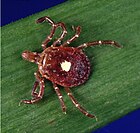Raphignathoidea
| Raphignathoidea | |
|---|---|
| Scientific classification | |
| Kingdom: | |
| Phylum: | |
| Class: | |
| Subclass: | |
| Superorder: | |
| Order: | |
| Section: | |
| Superfamily: | Raphignathoidea Kramer, 1877
|
| Families | |
|
11; see text | |
The Raphignathoidea is a superfamily of the Acari (mite) Order Trombidiformes. It contains many predators of small invertebrates, while some are herbivores and others parasites.[1]
The predatory Raphignathoidea are of some commercial importance, as many are suitable for biological pest control. They are bred and released to control such plant pests as gall mites (Eriophyidae), spider mites (Tetranychidae) or scale insects (Coccoidea) in agriculture and forestry.[1]
This is a diverse and widespread group of mites. With about 62 genera and some 877 species,[2] Raphignathoidea mites are abundant on most continents, including a few that have colonized Antarctica. The lineage dates back at least to the Paleocene–Eocene boundary, about 56 million years ago.[1]
Families
- Barbutiidae Robaux, 1975
- Caligonellididae Grandjean, 1944
- Camerobiidae Southcott, 1957
- Cryptognathidae Oudemans, 1902
- Dasythyreidae Walter & Gerson, 1998
- Eupalopsellidae Willmann, 1952
- Homocaligidae Wood, 1970
- Mecognathidae Gerson & Walter, 1998
- Raphignathidae Kramer, 1877
- Stigmaeidae Oudemans, 1931
- Xenocaligonellididae Gonzalez, 1978
References
- ^ a b c Qing-Hai Fan; Zhi-Qiang Zhang (2005). Fauna of New Zealand Number 52 Raphignathoidea (Acari: Prostigmata). Manaaki Whenua Press. ISBN 0-478-09371-3.
{{cite book}}: Unknown parameter|lastauthoramp=ignored (|name-list-style=suggested) (help) - ^ Zhi-Qiang Zhang; Qing-Hai Fan; Vladimir Pesic; Harry Smit; Andre V. Bochkov; A. A. Khaustov; Anne Baker; Andreas Wohltmann; Tinghuan Wen; James W. Amrine; P. Beron; Jianzhen Lin; Grzegorz Gabrys; Robert Husband. "Order Trombidiformes Reuter, 1909" (PDF). In Z.-Q. Zhang (ed.). Animal biodiversity: An outline of higher-level classification and survey of taxonomic richness. Vol. 3148. pp. 129–138. ISBN 978-1-86977-849-1.
{{cite book}}:|journal=ignored (help)

